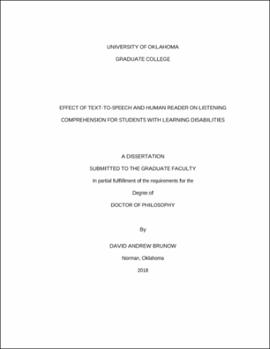| dc.contributor.advisor | CULLEN, THERESA | |
| dc.contributor.author | BRUNOW, DAVID | |
| dc.date.accessioned | 2018-12-13T20:50:44Z | |
| dc.date.available | 2018-12-13T20:50:44Z | |
| dc.date.issued | 2018 | |
| dc.identifier.uri | https://hdl.handle.net/11244/316759 | |
| dc.description.abstract | Students with learning disabilities in reading often have difficulty with comprehension. In this study, four participants with learning disabilities, ages 16 and 17, were assessed in listening comprehension using an alternate treatment design to determine the effect of two treatments (a) text-to-speech, and (b) human reader on listening comprehension using text excerpts and multiple-choice listening comprehension quizzes from Harper Lee's novel To Kill a Mockingbird. Results, although mixed, found that mean scores for listening comprehension were greater during the human reader treatment. Implications and conclusions of this study revealed that text-to-speech may benefit students with learning disabilities who struggle with reading and comprehension when used as a supplement to explicit teacher instruction, however, the text-to-speech was not as effective as a human reader on listening comprehension for students with learning disabilities. | en_US |
| dc.subject | Education, Special. | en_US |
| dc.subject | LEARNING DISABILITIES | en_US |
| dc.subject | TEXT-TO-SPEECH | en_US |
| dc.subject | ASSISTIVE TECHNOLOGY | en_US |
| dc.title | EFFECT OF TEXT-TO-SPEECH AND HUMAN READER ON LISTENING COMPREHENSION FOR STUDENTS WITH LEARNING DISABILITIES | en_US |
| dc.contributor.committeeMember | WILLIAMS-DIEHM, KENDRA | |
| dc.contributor.committeeMember | HENNESSEY, MAEGHAN | |
| dc.contributor.committeeMember | CROWSON, H. MICHAEL | |
| dc.contributor.committeeMember | MACKEY, HOLLIE | |
| dc.date.manuscript | 2018 | |
| dc.thesis.degree | Ph.D. | en_US |
| ou.group | Jeannine Rainbolt College of Education::Department of Educational Psychology | en_US |
